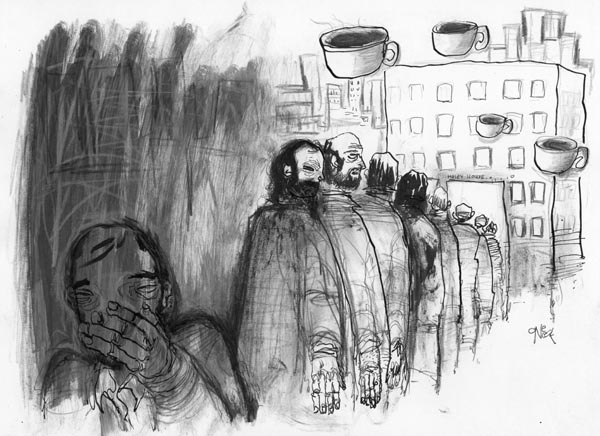The Life Deliberate
We’ll Drink Coffee During the Revolution
by Anna Clark
illustration by One Neck
I ARRIVED at Boston’s Haley House in early 2005, expecting to stay five months. My lukewarm commitment testifies to my doubt that this place was for me. Back in Michigan, I had been restless, looking for something new and engaging to do with my life, and I imagined Haley House as a curious pitstop along the way. Nearly a year and a half later, I’m still here.
I’m still not great at describing it in 25 words or less, but here goes: Haley House is an intentional live-in community that engages with poverty and class in Boston. We draw from the Catholic Worker tradition: personalist approaches to real justice, eschewing charity. Embracing simplicity and unique approaches to spirituality. Together, we manage a small soup kitchen in the heart of Boston’s gentrified South End, as well as a food pantry, cloth- ing room, music jam sessions, and writing and culinary workshops. We have an organic farm an hour away, housing a second community, where we work regularly with guests from the kitchen. We run an affordable housing program in the South End and host the street magazine Whats Up.
During my first summer here, we expanded our bakery—which doubles as a job training program—into a full café in Dudley Square. It’s a fantastic space, colorful and supportive of local artists. Organic food is sold cheaply, making good food available to the people in Roxbury who typically don’t have the means to access it. Many people in the training program are just out of rehab or prison; upon completion of a six-month paid holistic training program, we support them in finding related employment.
See—I suck at explaining Haley House in a soundbite. It needs more words.
But the point is this: I came here uncertainly and I stayed because the house’s mission to break down boundaries between people who are typically isolated from each other—homeless men and South End professionals; immigrants and college students; me and you—resonated deeply with me.
Living and working in the same place is no joke. I detest waking up extraordinarily early on the mornings I work at breakfast. I’ve been surprised more than once to find one of the guests sleeping inside our door. Sometimes shutting the door to my room isn’t enough for me to get some peace. I’ll admit that I escape—I leave the house with nowhere to go, desperate to be somewhere else, to be alone. We eat the same food we serve, delivered to us from Boston’s Food Bank, and there are times when rummaging through the near-expired goods, or trying to come up with a new way to prepare kidney beans, makes me want to choose death first.
But despite this, it comes down to the smaller moments. For me, it all comes back to the coffee.
Last summer, my housemates and I were recruited for a coffee taste-test. While our old storefront bakery had served Equal Exchange, the opening of the new café offered the opportunity to try new fair-trade brands. So I had the welcome task of drawing my chair out to the brick sidewalk one morning with Adam and Ali, sitting in the sun, and declaring whether we preferred Cup 1 or Cup 2, and to offer a couple of adjectives to capture the taste. An Equal Exchange rep was there to help with the test. So while the three of us were chatting it up, we asked the rep about what the hell fair trade really means, and whether all fair trade is the same, and why she was personally involved. A couple people we know from our kitchen, Bethany and John-Paul, happened upon us, and they pulled out chairs to participate in the taste test.
And it was just a morning of sun, and coffee, and me and my friends.
This morning happened to occur at the five-month mark—that is, when I’d initially planned on moving on to my “real” life. But that morning captured why I wasn’t ready to leave.
Here, unexpectedly, in my own home, I had a chance to learn about fair trade from a woman who works on the inside.
Here, people are engaged in creative activism—creating alternative possibilities for a just world, rather than merely resisting what’s out there (though resistance certainly has an important place).
Here, communities are created, and not just on one side of the kitchen counter—my housemates, all of us from relatively privileged backgrounds, have space to connect with people we’d otherwise never know.
While many of us feel crushed by the weight of all the suffering in the world, why would I not dig into a space with so many possibilities? So many friends? So much good coffee?
Anna Clark reports that Haley House Bakery Café ended up choosing Equal Exchange coffee after all, and serves it at affordable prices. For more information about Haley House, check out haleyhouse.org. For more information about Whats Up Magazine, check out whatsupmagazine.org.
